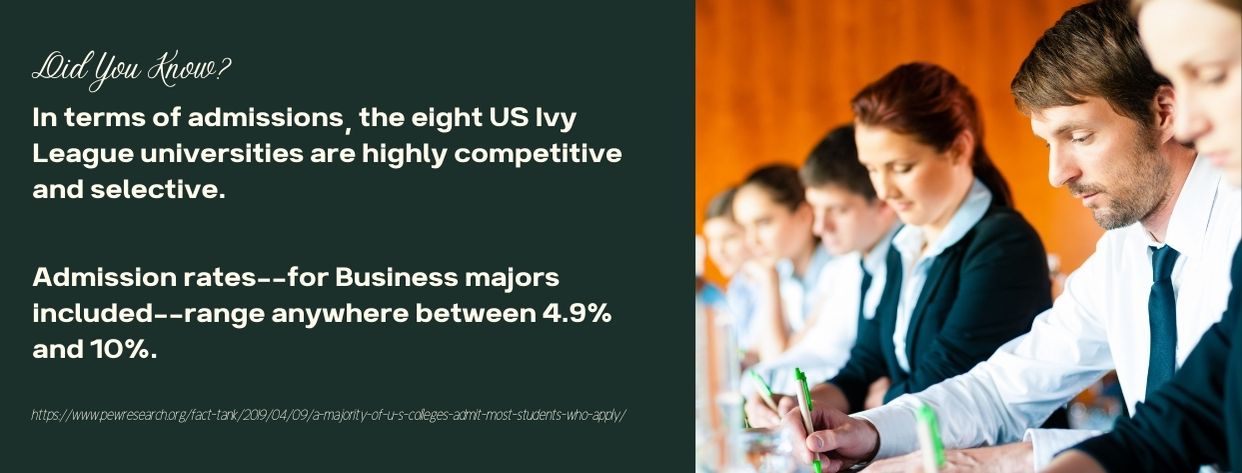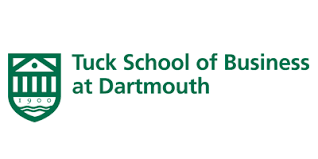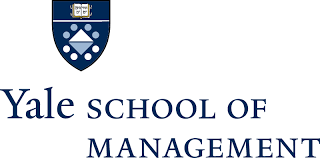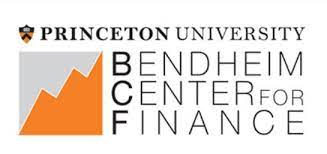Find Your Perfect School
The term “Ivy League” was birthed to group the “ancient eight,” or eight of the oldest schools in the US for sports, specifically the inauguration of the NCAA Division I Conference in 1954. Eventually, the Ivy League schools represented academic excellence and social prestige, which holds true still today.
The Ivy League is comprised of these schools:
- Brown University
- Columbia University
- Cornell University
- Dartmouth College
- Harvard University
- Princeton University
- University of Pennsylvania
- Yale University
All schools are located on the East Coast.
Admission to these schools is highly competitive and selective, ranging from 4.9% to 10% every year, with Harvard University as the most selective. In 2021, the Ivies have set the record for its lowest acceptance rates in a long while, with both Harvard and Columbia reporting the lowest acceptance rates at 3.4% and 3.7%, respectively.
It is hard to get in. But it is also just as difficult to stay within its halls. Studying at any of the Ivy League schools is expensive. Students either come from affluent families or have the financial support or aid to carry them through their studies. Because of this, students who get in the Ivies have a certain pride or bragging rights.
The cost of attendance for the 2020 academic year ranged from $50K (for Princeton) to $59K (for Columbia). These rates included all other expenses aside from matriculation like housing, student services, and learning materials.
Despite all these, students still flock to the chance to apply at any of these schools, especially those coming from minorities and first-generation attendees. There is still a benefit in gaining an Ivy League education, especially in the corporate world.
Perhaps, the greatest benefits are the connections and breadth of a professional network that can provide real leverage in securing gainful employment. In a globally connected economy where women and non-Caucasian graduates have to prove themselves doubly hard compared to their male Caucasian counterparts, a referral, an introduction, or positive word-of-mouth from a fellow Ivy alum can provide the pivotal boost these sectors need to level the playing field.
So, should you or should you not apply to an Ivy League school? Of course, you should try, there is no downside, and you have nothing to lose. If you are more inclined to pursue a business degree, we have ranked these eight schools from the most to least competitive in their business program offerings to help you decide.
Methodology
We have ranked the schools according to the following criteria (in order of value and importance):
- Availability of an MBA program alongside other related master’s degrees (e.g., MHA, MPA, etc.). An MBA still holds the prestige of being the flagship program of a business school, but having other program offerings illustrates its breadth of expertise and knowledge in other related disciplines that students can take advantage of, especially if they would like to focus on a specific industry such as healthcare, finance, governance or marketing.
- Availability of certificate programs, like executive education, and other options for non-degree training. Students who may not have the resources or the time to commit to a full-time program opt for short online courses offered by Ivy League schools. For many employers, these “stackable” non-degree certificates are sufficient to demonstrate competency with the pedigree of an Ivy-branded education.
- Availability of joint degrees. Although the cost may prevent some students from pursuing these, this is also a viable alternative to the first criteria. High-achieving and ambitious students – which are prime characteristics of Ivy League attendees – may consider this pathway.
- Availability of ample opportunities for cross-industry research and experiential learning.
- Tuition fees and availability of scholarships and aid were not considered in the ranking, as it has been established that attending any of these elite schools is costly. It evens out the playing field in that respect. This ranking focuses on what the school can provide students regarding program availability, variation (options), and other valuable metrics as itemized in the criteria above.
Best Ivy League Schools for Business
The Wharton School of Business
University of Pennsylvania
The University of Pennsylvania founded the first business school in the country in 1881, the Wharton School of Business. Even before the turn of the century, Wharton had several landmark achievements impacting the global stage. Shiro Shiba and former US Ambassador Robert Adams, Jr., who both held prominent positions in international affairs, were among the first five alums of the school.
In 1921, Wharton started offering a full-time MBA program. From 1971 onwards, the school became the pioneer in offering interdisciplinary business studies, such as:
- The first MBA degree in Healthcare Management
- The first joint Management and Technology undergraduate program
- The first joint MBA and MA in International Management program
The Executive MBA (EMBA) option was introduced in 1975.
To this day, Wharton offers the most extensive list of joint MBA programs. MBA students under this pathway can also choose to pursue law, international studies, engineering, governance/public administration, education, dental medicine, healthcare management, medicine, environmental sciences, nursing, social work, or veterinary medicine.
Wharton also offers nine Ph.D. programs, as well as non-degree and customizable executive education certificates, that are available to both individuals and companies.
At the undergraduate level, the school offers joint degree programs that allow college students to earn a business or management degree plus a second degree in either nursing, engineering, or liberal arts disciplines. An individual BS degree in Economics is also offered.
Columbia Business School
Columbia University
Columbia Business School (CBS) was founded in 1916 within the halls of Columbia University. It is slated to move to its new home at the university’s Manhattanville campus in early 2022.
Its maiden class only had sixty-one students, but with, remarkably, eight female students. Eleven professors taught the class. This number, along with their breadth of experiences, grew over time. Current CBS faculty members boast of extensive industry experience in New York and other financial hubs that they bring into their teachings.
CBS offers the MBA degree via two routes:
- Full-time MBA, with a dual degree option of another master’s degree or a professional doctorate, and,
- An Executive MBA (EMBA), where enrolled working professionals can choose between weekend classes or blocked weekday classes to suit their loaded schedules.
CBS also offers advanced degrees in other business concentrations, such as:
- A one-year Master of Science in Marketing (MSM) program,
- One two-year Master of Science in Financial Economics (MSFE) program,
- A one-year Master of Science in Accounting and Fundamental Analysis (MSAFA) program, and,
- The MSBA or Master of Science in Business Analytics and MSMSE or Master of Science in Management Science and Engineering programs are joint offerings from CBS and Columbia Engineering. Each program can be completed in three terms.
Columbia Business School also offers Ph.D. programs in various business concentrations, such as:
- Accounting,
- Business Economics,
- The Decision, Risk, and Operations,
- Finance,
- Marketing, and,
- Management
All programs require a dissertation defense for completion and degree conferment.
Tuck School of Business
Dartmouth College
Dartmouth College’s Tuck School of Business was established in 1900 and is regarded as the first school to launch an MBA program in the country. The timing of its conception could not have come at a better time, as this was the century that saw the birth of revolutionary industries and companies, the enactment of the GI Bill, and the popularization of the “American Dream.”
The school, named after famed businessman Edward Tuck, currently offers an MBA program that students can complete in one year. The program also requires students to undergo an international experiential course, proprietarily named TuckGO. This program exposes them to cultures and ways of doing business in different countries.
Tuck also houses centers that offer further concentrated experiential learning to sharpen specific business skills and interests among students enrolled in the MBA program. These are:
- Revers Center for Energy
- Center for Digital Strategies
- Center for Health Care
- Center for Private Equity and Venture Capital
- Center for Entrepreneurship
- Center for Business, Government and Society
In addition, the school also offers other non-degree certificate programs, such as:
- The Advanced Management Program (AMP), which is a two-week boot camp specifically designed for business leaders, and,
- The Next Step – Transition to Business program, an online certificate program specifically designed for military veterans and former athletic professionals aspiring to venture out in the business world.
All these program offerings are taught by the same faculty that delivers Tuck’s MBA program.
Samuel Curtis Johnson Graduate School of Management
Cornell University
The Samuel Curtis Johnson Graduate School of Management or simply “Johnson” was established in 1946 at Cornell University. Since then, it has produced more than 15,000 graduates. Its robust faculty is comprised of 58 full-time professors and 53 visiting professors.
Johnson currently offers the following MBA programs:
- A full-time, two-year MBA with deep integration with STEM courses such as programming and data analytics.
- A more rigorous yet accelerated one-year MBA, also with a deep STEM integration.
- A practical one-year Tech MBA, with heavy concentration – about 75% of the curriculum – on topics like financial technology, digital marketing, technical strategy, and data-based product development, backed by extensive hands-on exercises at Cornell Tech in NYC.
- An Executive MBA (EMBA), with two delivery points – an in-campus delivery (Metro NY Program) at Cornell’s NYC campus and a hybrid delivery (Americas Program) for those opting for distance and part-time education.
- Joint and sequential programs with any of the following second degrees: Law (JD), Industrial and Labor Relations (MILR), Medicine (MD), Health Administration (MHA), Engineering (MS Eng.), and Public Administration (MPA).
- And an accelerated undergraduate-to-MBA (4+1) pathway, which can be completed in five years.
Johnson also offers a dual degree international MBA for business professionals stationed in China. The Finance MBA program is offered in partnership with the renowned Tsinghua University. It is a bilingual, in-campus program (Beijing) that can be completed in two years. Graduates are then conferred with two degrees – an MBA and a Master’s degree in Finance.
Harvard Business School
Harvard University
Harvard Business School (HBS) launched its MBA program in 1908. Its doctoral offering succeeded this in 1922. In the same year, the prestigious Harvard Business Review was also launched. It is also the first school to offer Executive Education or non-degree certificate training for working professionals and military veterans. It was launched in 1945, right at the end of World War II.
The school currently offers only a full-time on-campus MBA program that can be completed in two years. It also offers six joint programs where students can simultaneously earn another master’s degree or professional doctorate with the MBA degree. These are:
- Master of Science in Life Sciences
- Master of Public Policy
- Master of Public Administration – International Development
- Juris Doctor (Law)
- Doctor of Medicine
- Doctor of Dental Medicine
- Master of Science in Engineering Sciences
HBS also offers eight doctoral programs in the following business sub-disciplines: Accounting, Management, Business Economics and Finance, Health Policy Management, Marketing, Organizational Behavior, Strategy, and Technology and Operations Management.
HBS also opened its doors to non-enrolled students seeking a Harvard-based education through HBS Online. The portal offers synchronous and asynchronous courses that allow students to earn training certificates or even undergraduate credit. One of the standout courses in this platform is the Harvard Business Analytics Program, available to MBA students and graduates seeking to be adept in data science and analytics.
Yale School of Management
Yale University
Yale University’s School of Organization and Management was founded in 1973. Twenty years later, the school’s name was changed to what is known today as the School of Management (SOM). In 1999, Yale SOM offered its first full-time MBA program, followed by an EMBA offering in 2005.
At present, the school continues to offer the full-time MBA and Executive MBA (EMBA) programs. A direct undergraduate-to-MBA pathway is also available to Yale undergraduate seniors through its Silver Scholars Program.
Students enrolled in the MBA program can also simultaneously pursue another graduate degree. This can be a master’s degree in Public Health, Forestry/Environmental Studies, Global Affairs, Architecture, Drama, or Divinity. A degree in Medicine or Law, or a Ph.D. degree from the Graduate School of Arts and Sciences are also available options. This joint degree pathway reduces the completion time by as much as a year compared to when the programs are taken separately. Business-focused Ph.D. programs are also offered, but this is outside of the joint degree pathway.
Aside from an MBA, Yale SOM also offers management-focused master’s degrees, such as Advanced Management, Asset Management, Systemic Risk, Global Business & Society, and Public Education Management programs.
It also offers non-degree certificate programs for working individuals or company employees (locally or internationally employed, and applicable to employees whose employers have a partnership agreement with Yale SOM). Executive Education, as the school brands it, offers courses on Management, Sustainability, Business Perspective, Healthcare Management, Leadership, and Digital Marketing, among others.
School of Professional Studies
Brown University
Founded in 1764, Brown University is one of the oldest universities in the US. Its School of Professional Studies (SPS) houses its lone MBA program, the Executive MBA for seasoned professionals, and two other advanced programs – the Master’s in Healthcare Leadership and Master’s in Technology Leadership programs.
The SPS offers an Executive MBA program in partnership with Spain’s Instituto de Empressa, thus the name of the program, the IE Brown Executive MBA. The 15-month program is of a hybrid format and requires a five-week residency either at the Brown campus in Rhode Island or the IE Business School campus in Spain. Some of the standout features of the curriculum include courses on relevant topics like Technology & Innovation Strategy, Society and Culture in the Age of Globalization, The Rise of China, Understanding Health Disparities, Entrepreneurial Opportunities in Developing Regions, and Globalization and the Arts, to name a few. All these are offered along with Executive MBA essentials like Financial Accounting, Entrepreneurial Management, Financial Management, and Managerial Economics.
Brown SPS also offers executive education courses curated for both individual professionals and company employees. It offers courses on communication, coaching, leadership, and problem-solving. Certificates are issued to participants after completing the courses.
Bendheim Center for Finance
Princeton University
Princeton University founded the Bendheim Center for Finance (BCF) in 1997. It does not offer any MBA programs in any form. Instead, Its focus is on finance and economics and its integration with information technology. In line with this, it offers two programs – an undergraduate non-degree certificate in Finance and a Master’s in Finance program.
A master’s degree in finance is a viable alternative for those seeking advanced degrees in the business realm. Not only does Princeton’s BCF’s MF program have a heightened focus in securities, risk, trading, income and price analytics, and asset management, but it is also deeply integrated with concepts on information technology, engineering, operations, research, data science, fintech, and machine learning.
Its graduates are groomed for roles that require current business and technology integrative knowledge, which is an entry-level requirement nowadays among various business organizations, especially those in innovation and advancement.
Students enrolled in the MF program full-time (two years) can also pursue the BCF Machine Learning Certificate—the first of its kind at the graduate level. The program aims to upskill graduate students with the essentials of Machine Learning, focusing on its application in finance, economics, entrepreneurship, and fintech.










